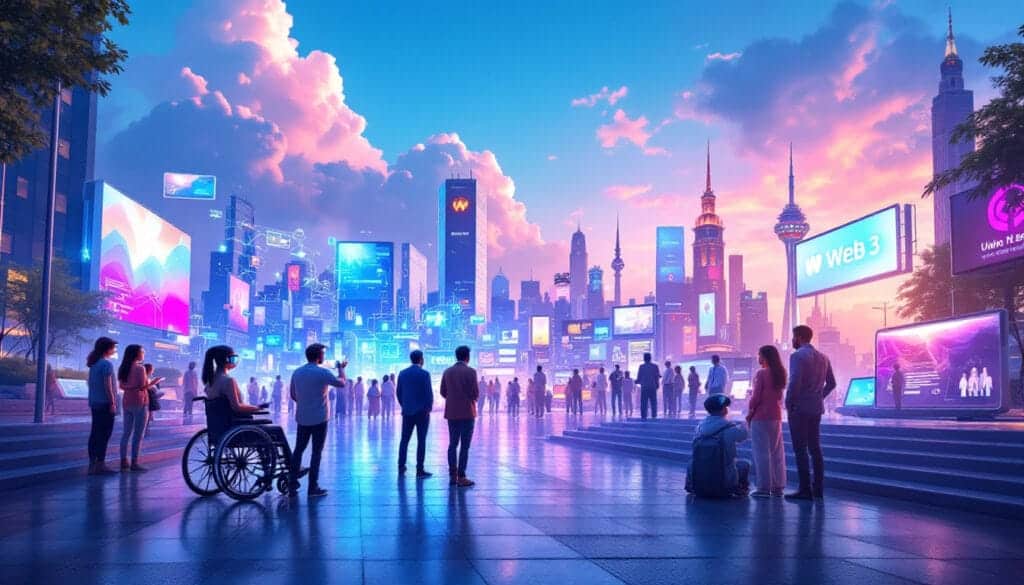Rapid urbanization poses significant challenges for cities that must rethink their functioning for a sustainable future. Smart cities are emerging as an innovative response to these crucial issues. By combining advanced technologies such as the Internet of Things (IoT) and artificial intelligence, they are gradually transforming urban management. These connected metropolises aim to improve the quality of life for citizens by optimizing the use of natural resources, enhancing mobility, and strengthening environmental resilience, while raising essential questions about access inequality and data protection.
Table des matières
ToggleGlossary – Understanding Smart Cities
Smart cities, known as “Smart Cities,” represent a revolution in modern urban planning. With the rise of digital technologies, these cities aim to optimize urban services through the integration of cutting-edge technologies, enabling better interconnection between infrastructure and citizens.
A key component of smart cities is the design of interconnected systems to effectively manage resources. This includes the use of sensor networks for real-time data collection, essential for improving services such as transportation, energy, and waste management. Through these advancements, a reduction in carbon footprint is achievable, thus contributing to environmental sustainability.
Another fundamental element is the Internet of Things (IoT). This technology allows various devices to connect within a network, thus facilitating the exchange of information between them. IoT applications in smart cities include smart streetlights that adjust their brightness based on pedestrian presence, and heating systems in buildings that adapt to real-time energy needs.
The 5G also plays a crucial role in the development of smart cities. It offers increased bandwidth and faster connections, thus enabling seamless and immediate communication for the thousands of interconnected devices needed for a smart city. This technology is essential for the proper functioning of public transport systems, water management, and urban security.
Mobility solutions, such as MaaS (Mobility as a Service), transform urban travel by integrating various modes of transport into a single digital service. This approach fosters a more efficient use of public transport, thus reducing congestion and improving accessibility.
However, the adoption of smart cities is not without challenges. Inclusivity must be a central pillar, with strategies aiming to reduce inequalities in access to technologies. Moreover, the protection of personal data is essential. The management of massive data collected requires rigorous cybersecurity protocols to prevent breaches and protect citizens’ privacy.
Therefore, smart cities must adopt an ethical and transparent approach, ensuring that technological innovations remain at the service of humanity. By integrating these technologies into a sustainable vision of urban planning, Smart Cities allow for the creation of more resilient environments, adapted to the changing needs of urban populations.
In summary, the transition to a smart city requires cooperation among governments, businesses, and citizens. The active participation of residents is crucial to ensure that these transformations genuinely meet local expectations. For a deeper understanding of concepts surrounding Industry 4.0, you can consult this article on Klaus Schwab.

FAQ: Understanding Smart Cities
A : A smart city is a metropolis that uses advanced technologies, such as the Internet of Things (IoT), to optimize resource management, improve urban services, and enhance environmental sustainability.
A : Smart cities improve quality of life by optimizing transportation management to reduce traffic jams, monitoring air quality, reducing energy consumption, and providing accessible digital public services.
A : The main challenges include inequality of access to technologies, protection of personal data, cybersecurity, and the need to develop suitable infrastructures while ensuring social inclusion.
A : 5G plays a crucial role by providing ultra-fast connectivity necessary to support the Internet of Things (IoT) and enabling real-time data analysis, thus improving the efficiency of urban systems.
A : Smart cities encourage citizen participation by implementing digital platforms where residents can express their opinions and contribute to decisions, thus strengthening participatory democracy.





